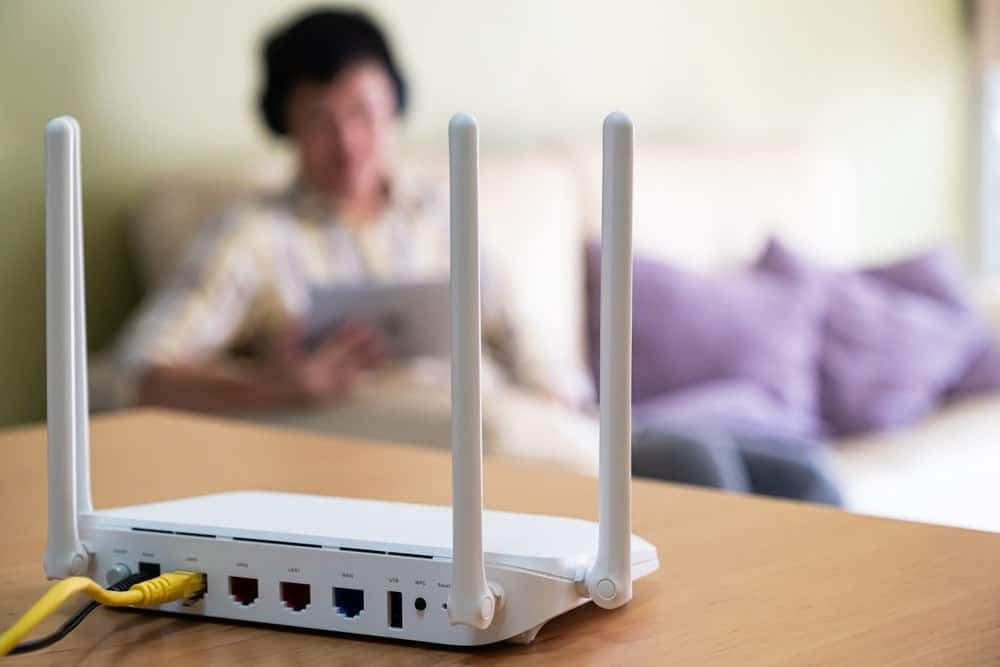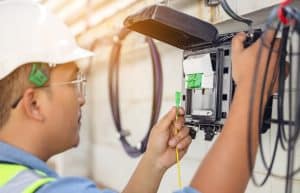Home > Internet Plans > Modem vs Router
Modem vs Router
Modems and routers are both important for your home or business internet connection, but what do they do?
Author
Savvy Editorial TeamFact checked

You might’ve heard the terms ‘modem’ and ‘router’ before when it comes to internet plans, but you may not know the difference between them. While these two devices are essential for getting your home or office online, they serve distinct roles in the process.
In Savvy’s handy guide, we'll help demystify the modem vs router debate, explaining their functions, how they work and which one might be the right choice for your specific internet needs. Learn more about them right here with us today!
What are the differences between modems and routers?
Modems and routers are two distinct devices that serve critical roles in getting your internet plan up and running. Here's a breakdown of their differences:
Function
- Modem: a modem is responsible for modulating and demodulating data signals. It's the gateway between your local network and your internet service provider (ISP). Modems translate the digital data from your devices into signals that can travel over your ISP's network and vice versa.
- Router: a router, on the other hand, manages data traffic between devices within your local network. It acts as a central hub, directing data packets between your various devices and ensuring they reach their intended destinations efficiently.
Physical connection
- Modem: modems typically have one or more ports for connecting to your ISP's network via a coaxial cable, fibre optic cable or other means. They don't usually have multiple ports for connecting multiple devices.
- Router: routers have multiple ports and sometimes Wi-Fi capabilities for connecting several devices within your home or office network. They create a local area network (LAN) to facilitate communication among your devices.
IP address
- Modem: modems often have a single public IP address assigned by your ISP. This IP address is visible on the internet and serves as the entry point for data to and from your network.
- Router: routers assign local IP addresses to devices on your network. These private IP addresses enable devices to communicate with each other while sharing the modem's single public IP address to access the internet.
Security
- Modem: modems typically don't provide robust security features. Their primary role is data translation and transmission.
- Router: routers often include security features like firewalls and port forwarding to protect your local network from potential external threats.
In summary, modems and routers have distinct functions: modems connect you to your ISP and the internet, while routers manage data traffic within your local network. Both are essential for a complete and functional internet setup.
How do I find out if I need a modem or a router for my NBN connection?
Whether you need a modem or router (or both) will ultimately depend on the nature of your connection. For example, different NBN connection types require different configurations. These include:
- Fibre to the Premises (FTTP): because your NBN connection box effectively acts as a modem itself, you’ll only need a router for your setup.
- Fibre to the Node (FTTN): you’ll need a modem router for FTTN connections, which enables you to send and receive data as well as distribute it.
- Fibre to the Curb (FTTC): like FTTP, you’ll likely only need a router to establish a FTTC connection for the NBN.
- Fibre to the Building (FTTB): the requirements for FTTB connections are essentially the same as those for FTTN, meaning you’ll need a compatible modem router.
- Hybrid Fibre Coaxial (HFC): HFC connections typically only require a router to hook you up to the internet at your home or office.
- Fixed Wireless: you’ll need a router to connect you to the box provided by your ISP or NBN Co.
- Satellite: like Fixed Wireless, a router will be enough to link to your satellite modem.
Will my NBN plan come with a router or modem included?
Almost all NBN plans come with either a modem, router or modem router included as part of the deal. This is sometimes offered for free, though this may be conditional on you remaining signed up to your plan for a certain period, such as 12 to 24 months.
However, in some cases, you may be able to use an existing modem or router from a previous plan, provided it’s compatible with your new provider and plan. If you’re charged for your modem, this may end up being a more cost-effective way to establish your new internet connection.
However, it’s important to note that some providers may charge activation fees if you BYO modem, so it’s important to consider which option is best for your needs and budget.
More common questions about modems vs routers
There isn’t one better option between the two, as both can be very important in establishing a connection at your home or business. However, if you were looking for a more convenient option, a modem router (modem with built-in routing capabilities) will likely require less setup than a separate modem and router.
If you wish to distribute your data connection to your various home devices, you’ll need a router. Whether this comes separately or as part of your modem will depend on your provider or the equipment you already have in your home.
In most cases, the modem provided with your home wireless broadband plan will also serve as a router, minimising the setup compared to some fixed line connections.
Helpful guides on internet plans
Receive a $50 Woolworths eGift Card*
Receive a $50 Woolworths Bonus Store eGift Card when you purchase a Broadband Plan via Savvy's partner, Econnex Comparison. Terms and conditions apply.

Compare internet plans with Savvy
Disclaimer:
Savvy is partnered with Econnex Comparison (CIMET Sales Pty Ltd, ABN 72 620 395 726) to provide readers with a variety of internet plans to compare. We do not compare all retailers in the market, or all plans offered by all retailers. Savvy earns a commission from Econnex each time a customer buys an internet plan via our website. We don’t arrange for products to be purchased directly, as all purchases are conducted via Econnex.
Any advice presented above is general in nature and doesn’t consider your personal or business objectives, needs or finances. It’s always important to consider whether advice is suitable for you before purchasing an internet plan. For further information on the variety of internet plans compared by Econnex, or how their business works, you can visit their website.
- The Promoter is CIMET Sales Pty Ltd ABN 72 620 395 726. Level 18/570 George Street Sydney, NSW 2000. Econnex Comparison is powered by CIMET.
- Promotion available on qualifying Broadband Plan purchases between 1st February 2024 to 31st July 2024 (“Promotional Period”) and may be withdrawn at any time by Econnex Econnex Comparison retains the right to change or alter the terms of this offer.
- You (“Customer”) will receive $50 worth of Woolworths Bonus Store eGift Cards when you purchase a Broadband Plan via Econnex Comparison, subject to these Terms and Conditions.
- Information on how to qualify to receive the Woolworths Bonus Store eGift Card forms part of these Terms and Conditions. Participation in this promotion is considered acceptance of these Terms and Conditions.
- To be eligible to receive the Woolworths Bonus Store eGift Cards, you must purchase the Broadband Plan via the following link: https://app.econnex.com.au/broadband?rcCode=90709
- You must switch to a new Broadband retailer. Customers who change plans via Econnex but remain with the same retailer will not be eligible.
- Your Broadband Plan must be connected within 30 days from the date of purchase.
- Eligible Recipients will receive the applicable Woolworths Bonus Store eGift Cards by email up to 120 days after purchasing the Broadband Plan.
- Econnex Comparison is not liable if any Customer details supplied are incorrect.
- Econnex Comparison is providing this offer in conjunction with the retail services offered on its platform.
- Details of Econnex Comparison retailers can be found at the following link: https://www.econnex.com.au/approved-providers-list
- You must be an Australian resident aged 18 or over. Econnex Comparison may request you to provide a copy of your valid ID for identification purposes.
- The Promoter reserves the right, at any time, to verify the validity to receive the Woolworths Bonus Store eGift Cards and Customer’s information (including the Customer’s identity, age and place of residence) and reserves the right, in its sole discretion, to disqualify any individual who the Promoter has reason to believe has breached any of these Terms and Conditions, tampered with the claim process, or engaged in any unlawful or other improper misconduct calculated to jeopardise fair and proper conduct of the promotion.
- Errors and omissions may be accepted at the Promoter's discretion. Failure by the Promoter to enforce any of its rights at any stage does not constitute a waiver of those rights.
- When the request for a connection cannot be completed, is unsuccessful, or a request is made for the cancellation of your Broadband Plan within the first 30 days from the date of connection, you will not be eligible to receive any gift card.
- Woolworths Bonus Store eGift Card is subject to any issuer Terms and Conditions.
- Any ancillary costs with redeeming the gift cards are not included.
- No responsibility is taken for any lost or stolen Woolworths Store Bonus eGift Cards.
- If the Woolworths Bonus Store eGift Cards are unavailable, the Promoter reserves the right to substitute the Woolworths Bonus Store eGift Cards to a card with equivalent value, subject to directions from a regulatory authority.
- If the offer is not able to be conducted as reasonably anticipated, due to any reason beyond the reasonable control of the Promoter, including but not limited to: technical difficulties, unauthorised intervention or fraud, the Promoter reserves the right, in its sole discretion, to the extent permitted by law: a. to disqualify any individual; or b. to modify, suspend, terminate or cancel the promotion, as appropriate.
- This promotion cannot be used in conjunction with any other offer from Econnex
- Econnex Comparison will transfer your Broadband Plan request and details to the selected retailer.
- Econnex Comparison may contact you to clarify any details or discrepancies in the information you provided for your Broadband Plan purchase.
- To cancel your request, you will need to contact the Broadband Plan retailer and inform them of your decision.
- Please note that we do not compare all brands in the market, or all products offered by all brands.
- If you have any inquiries regarding your Broadband Plan purchase, you can contact us directly at 1800 013 000 or email us at [email protected]
- Econnex Comparison Terms and Conditions: https://www.econnex.com.au/terms-and-conditions/
- By participating in this promotion, the individual authorises the Promoter to collect, hold, use and disclose their personal information in accordance with Econnex’s privacy policy, including providing such information to third parties such as contractors, service providers, suppliers and where required or authorised by law. Econnex’s Privacy policy can be found at https://www.econnex.com.au/privacy-policy
- Econnex may, unless the individual tells us not to, use the information to communicate with them by mail or electronically by, for example, email, phone, SMS to issue direct marketing and commercial communications telemarketing calls.
- To opt out of direct marketing access, update, or correct personal information you may contact us at [email protected]
- Woolworths Group Ltd ABN 88 000 014 675 is the issuer of the Woolworths Bonus Store eGift Card but is not the Promoter of the offer nor responsible for fulfillment of the offer terms.
- Woolworths Bonus Store eGift Cards have a fixed term expiry as displayed on the front of the gift card and are redeemable in-store and online at Woolworths Supermarket stores only.
- Woolworths Bonus Store eGift Cards are valid for 3 months from the issue date and Woolworths Bonus Store eGift Cards are not reloadable or redeemable for cash.
- Econnex Comparison and Woolworths will not replace, expired, lost, stolen, or deleted Woolworths Bonus Store eGift Cards.
- Check your Spam/junk email if you have not received a Woolworths Bonus Store eGift Card in your inbox within 120 days after activation of your Energy, Electricity or Gas Plan.
- Woolworths Store Bonus eGift Card is sent via email from [email protected] or [email protected]
- For enquiries related to the application, gift cards, or adding or removing any details on the application, please contact the Econnex Comparison at 1800 013 000 or e-mail us at [email protected]
- For the balance and transactions history on this Woolworths Bonus Store eGift Card and Woolworths Terms and Conditions visit https://woolworths.com.au/giftcards or call 1300 101 234.










